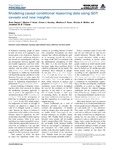Modeling causal conditional reasoning data using SDT: caveats and new insights
| dc.contributor.author | Trippas, D | |
| dc.contributor.author | Verde, Michael | |
| dc.contributor.author | Handley, SJ | |
| dc.contributor.author | Roser, ME | |
| dc.contributor.author | McNair, NA | |
| dc.contributor.author | Evans, JSBT | |
| dc.date.accessioned | 2019-07-12T14:35:58Z | |
| dc.date.available | 2019-07-12T14:35:58Z | |
| dc.date.issued | 2014-03-12 | |
| dc.identifier.issn | 1664-1078 | |
| dc.identifier.issn | 1664-1078 | |
| dc.identifier.other | ARTN 217 | |
| dc.identifier.uri | http://hdl.handle.net/10026.1/14633 | |
| dc.description.abstract |
In deductive reasoning, people are asked to infer the truth of an argument’s conclusion given a set of premises. Research into the processes underlying deduction has focused on examining how well people discriminate between logically valid and invalid arguments, and how irrelevant factors such as one’s prior beliefs interfere with the ability to reason logically (Evans et al., 1983). This normative approach to validity has traditionally informed both practice and theory in the literature. However, its critics argue that “normativism” often leads investigators to biased or misleading interpretations of phenomena (Elqayam and Evans, 2011). | |
| dc.format.extent | 217- | |
| dc.format.medium | Electronic-eCollection | |
| dc.language | eng | |
| dc.language.iso | eng | |
| dc.publisher | Frontiers Media SA | |
| dc.subject | causal conditionals | |
| dc.subject | reasoning | |
| dc.subject | signal detection theory | |
| dc.subject | belief bias | |
| dc.subject | normative models | |
| dc.title | Modeling causal conditional reasoning data using SDT: caveats and new insights | |
| dc.type | journal-article | |
| dc.type | Journal Article | |
| plymouth.author-url | https://www.webofscience.com/api/gateway?GWVersion=2&SrcApp=PARTNER_APP&SrcAuth=LinksAMR&KeyUT=WOS:000332784300001&DestLinkType=FullRecord&DestApp=ALL_WOS&UsrCustomerID=11bb513d99f797142bcfeffcc58ea008 | |
| plymouth.issue | MAR | |
| plymouth.volume | 5 | |
| plymouth.publication-status | Published online | |
| plymouth.journal | Frontiers in Psychology | |
| dc.identifier.doi | 10.3389/fpsyg.2014.00217 | |
| plymouth.organisational-group | /Plymouth | |
| plymouth.organisational-group | /Plymouth/Faculty of Health | |
| plymouth.organisational-group | /Plymouth/Faculty of Health/School of Psychology | |
| plymouth.organisational-group | /Plymouth/REF 2021 Researchers by UoA | |
| plymouth.organisational-group | /Plymouth/REF 2021 Researchers by UoA/UoA04 Psychology, Psychiatry and Neuroscience | |
| plymouth.organisational-group | /Plymouth/REF 2021 Researchers by UoA/UoA04 Psychology, Psychiatry and Neuroscience/UoA04 Psychology, Psychiatry and Neuroscience MANUAL | |
| plymouth.organisational-group | /Plymouth/Research Groups | |
| plymouth.organisational-group | /Plymouth/Research Groups/Centre for Brain, Cognition and Behaviour (CBCB) | |
| plymouth.organisational-group | /Plymouth/Research Groups/Centre for Brain, Cognition and Behaviour (CBCB)/Brain | |
| plymouth.organisational-group | /Plymouth/Research Groups/Centre for Brain, Cognition and Behaviour (CBCB)/Cognition | |
| plymouth.organisational-group | /Plymouth/Users by role | |
| plymouth.organisational-group | /Plymouth/Users by role/Academics | |
| dc.publisher.place | Switzerland | |
| dcterms.dateAccepted | 2014-01-01 | |
| dc.rights.embargodate | 2023-9-27 | |
| dc.identifier.eissn | 1664-1078 | |
| dc.rights.embargoperiod | Not known | |
| rioxxterms.versionofrecord | 10.3389/fpsyg.2014.00217 | |
| rioxxterms.licenseref.uri | http://www.rioxx.net/licenses/all-rights-reserved | |
| rioxxterms.licenseref.startdate | 2014 | |
| rioxxterms.type | Journal Article/Review | |
| plymouth.funder | Dual processes in reasoning: A neuropsychological study of the role of working memory::ESRC |


